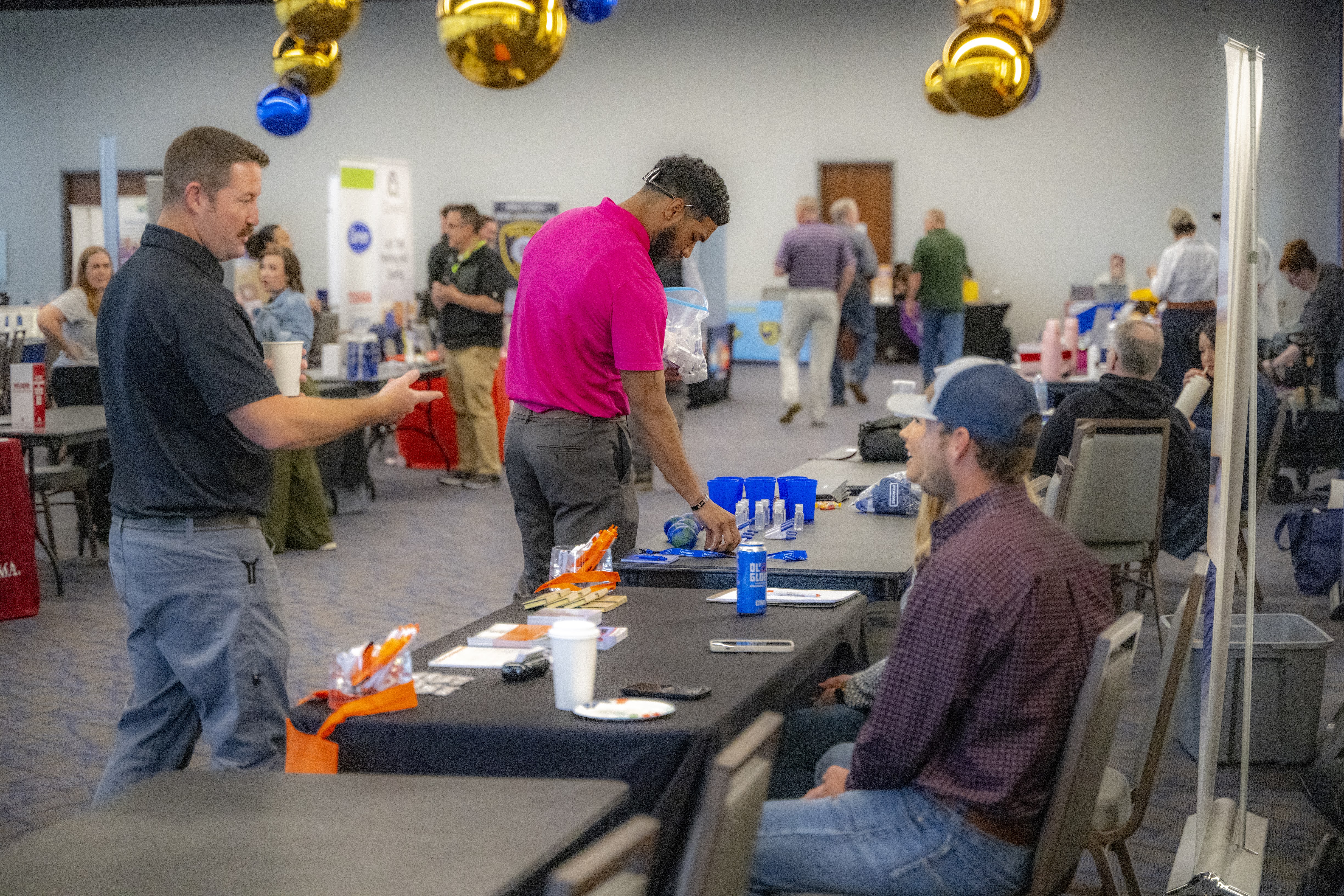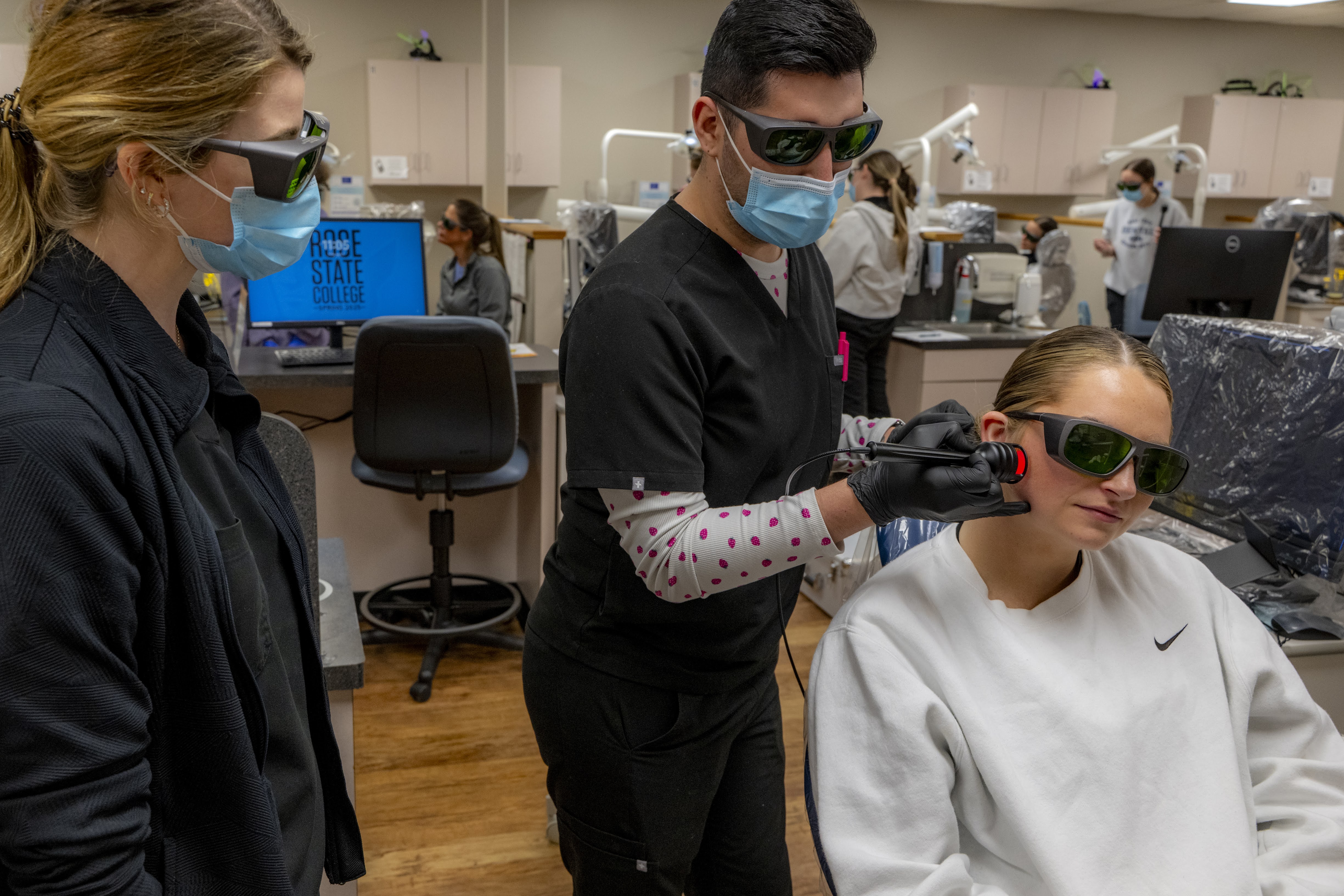Loftin, Lois
Born: March 24, 1927, Wilson, OK
Date Interviewed: Dec. 8, 2002
Interviewer: Brian Loftin
Topic: Tinker AFB employment during WWII
Q: Lois, where were you born?
A: I was born at Wilson, Oklahoma, according to my birth certificate. I was actually born out in the country near Dillard, Oklahoma. When I was born, it was quite an exciting event because I was the youngest of five children and the only girl. The first four were boys, so that was kind of something exciting.
Q: Where in Dillard did your family live?
A: My father worked for an oil company, and on the property where the lease was located lived our family along with four other families that were employed by the same oil company.
Q: Where did you attend school and for how long?
A: Well, I attended grade school at Rexroat School until my dad was promoted to field superintendent, and then was transferred to his own lease in Stonewall. Our family moved from Rexroat when I was 11. I went to high school at Stonewall School until I graduated from the 12th grade. In the 1930s and 40s, Stonewall was a school that had all 12 grades.
Q: What were your interests and hobbies as a young woman?
A: Mainly music. I studied music from the age of five. My mother and father sacrificed many things in order that all the children in the family could have a musical education. When I was 10, they bought me a piano that cost $500. I took piano lessons, and I recall in the evenings when supper was over, my mother and I would wash the dishes left from supper. Usually my mother would allow me to forego washing dishes if I would practice the piano. I’ll never forget how long she could wash those dishes! As a result of my hard work, at one point in time, I achieved the honor of giving my own recital at Ada, Oklahoma.
Q: When did you begin to get a sense that the United States was headed toward war?
A: I was pretty young at the time, but at the time Pearl Harbor was bombed I was in the hospital. I had been exposed to an infection in a previous operation, and I developed peritonitis. My family was very concerned about me and were afraid that I might die. You’ve got to remember that in that day and time there was not any of the modern day medicines that we have today. After I was well, we were always busy with everyday life, and in Stonewall people led a sheltered life. If the war was ever discussed, it was never in my presence.
Q: What was the atmosphere like and the mood of the people in the town where you lived?
A: Well, the most significant thing that I can remember – it really impressed me very much – that when Pearl Harbor was bombed, all the men around the United States were standing in lines to enlist in the military service. Everyone was anxious to be involved and do something for the war effort. It was no different in Stonewall, Oklahoma. All of my brothers were eventually enlisted in the military service. Two of them were stationed in the South Pacific, one was stationed in England, and another was in flight engineering training and was sent overseas.
Q: When did the government announce that women were going to be brought into the defense industry?
A: Well, I don’t recall what the reaction was when the government announced the need for women. I can only say that my brother’s wife and I wanted to take part in the war effort, and we would have to move from Stonewall to Oklahoma City to do it. That was in 1944.
Q: What was your reaction at the time?
A: Well, like I said, I was very young, and I didn’t understand the danger of the situation; however, as soon as I was out of high school, I got married and my husband was in training at an army base. Marie and I would eventually leave Stonewall together to help in the war effort.
Q: What was your family’s reaction at the time?
A: Well, all the families of servicemen bore a small flag about 8” x 12” and had a star for each son who was serving in the military. I can remember the pride that my mother and father had in displaying this in their window because their family had four starts on their flag.
Q: When did you decide to work at Tinker Air Force Base?
A: Well, in 1944 my sister-in-law and I went to Oklahoma City and went to work at Tinker Field. Her name was Marie Caldwell and she was one of the original “Rosie the Riveters” that worked for the government. After they had taken over the privately owned Douglas operation there, she got a job putting rivets in airplanes. I hired in as a clerk-typist, but was needed in the art department of the print shop, so they put me in the print shop.
Q: How did people close to you react to your decision?
A: With so many people’s lives on the line, it was a natural decision for us to help, and our families supported us and believed that we were doing the right thing. This was what everyone was trying to do – do something for the war effort.
Q: Did you know a lot of other women in your area that were also going to become involved in the defense industry work?
A: I was only aware that Marie and I were the only ones involved from Stonewall. You have to keep in mind that Stonewall was a very small town. I do remember that women left their kitchen and did whatever they could to help. Older women that were practically retired went to work and did what they could. I was only 17 and we had to wear a badge that said MINOR written on the bottom because of my age. If you were not supporting the war effort in some way, you were looked down upon.
Q: How did the process unfold as you went from civilian to defense industry worker?
A: As I said before, I was happy selling admission tickets at the local theater in Stonewall. This was kind of an important job for me. It made me feel important. The first job I ever had. Suddenly I was headed for Tinker Field in an effort to help win the war. That theater finally closed in the 1980s.
Q: What kind of job or jobs did you work? What were you responsible for?
A: At Tinker Field, the government taught me how to operate a Varitype machine for making photocopies of different forms we had created. The forms were to be reproduced for use throughout the base. I worked there for awhile, but eventually I was promoted to secretary for the section chief who was in charge of all the printing, photography, and silkscreen and different things.
Q: How many hours per day did you work and how many days per week did you work?
A: Well, if I recall correctly, we worked a normal shift – 8 hours a day, 40 hours a week. This was pretty much the routine of people I was in contact with.
Q: And what kind of pay did you receive?
A: I was drawing a salary of $2200 per year, and this was considered a good salary at that time.
Q: How long were you employed at Tinker Air Force Base?
A: I stayed there and continued to work at Tinker after the war was over, but I finally resigned my job with much regret in 1951 because I was needed at home to care of my children. I liked my job and would liked to have stayed there, but my children needed me at home.
Q: What was the mood of your fellow female workers?
A: Well, we all had the same feeling. We wanted to work hard and win the war, and we had a lot of camaraderie and support for one another.
Q: Was there a sense of camaraderie among the female workers and did you make life-long friends?
A: Oh, yes, I did make a lot of life-long friends. As I said before, I had a lot of good friends at work, some of which I still see and associate with today. I’d like to mention a few, if that’s OK. Their names are Jean Bowman, Doris Bogenshutz, Alice Naylor, Mrs. Gaston (I can’t remember her first name), and Agnes Meier was one of my closest friends, who has only recently passed away the past few years. I lost Jean Bowman, too, her husband owned Bowman Drug Store over on 13th Street.
Q: Did all the women enjoy their work or did the work prove to be too difficult for some of the women?
A: It didn’t seem to be a problem, at least I didn’t know of any problems. The women did the men’s work and were able to deal with their situation just fine.
Q: If so, could you please elaborate on whether or not women were treated equally, or if some women because of their background had a more difficult time than others. Please feel free to expand on anything do to with the diversity of women.
A: Well, you know, of course the women did the things that they were touted for and educated for. The women were treated with the respect that earned.
Q: What was the reaction of your fellow male workers?
A: They were just like us. We were just trying to win the war – do something for the war effort. So everybody treated as normal.
Q: How were you treated by them as well as the bosses that were in charge?
A: William Goddard was my direct supervisor and he treated me with the greatest respect. He was a good man, but I had the respect of all the men that I worked with.
Q: What was the overall atmosphere at Tinker Air Force Base and the surrounding area?
A: No matter what your situation or circumstances were, we were all a team, working toward one purpose, although doing different jobs. Didn’t matter if you were black or white, male or female, we all had one goal in sight – win this war.
Q: What kind of memorable occurrences did you witness or experience?
A: One in particular I remember was that there was a fire in the section where I worked, and our offices were in the upper deck over an airplane hanger. The fire started from below. Ten people were killed in this fire. It was a terrible tragedy and the property was a complete loss. I’ll never forget how some of them that were trapped in there were being held out the windows of the building.
Q: After the war, was there any kind of pressure from the government and the media for women to leave the workplace and return to the home so that the male veterans could once again have access to jobs?
A: I think it just kind of had a natural flow of what people personally wanted to do. When the war was over, some of the women wanted to go back to being housewives and work at home. Others chose to stay in the workplace. It was simply a matter of choice.
Q: When the war was over, did you quit working?
A: As I previously said, I worked until about 1951.
Q: How do you think the war years impacted the lives of the women in this country?
A: Just as many women at the time, I was very young when the war began. But if not for the necessity of women working outside the home during World War II, they would have continued doing housework, instead of being educated outside the home. If it had not been for the war effort, I would not have received the education I did. It helped me for the rest of my life.
Q: Did the skills you learn during the war serve you in any kind of way in the subsequent years after the war?
A: Well, yes, it certainly did because in the early 50s, in partnership with my husband, Boyd Loftin, we formed three construction companies, Loftin Homes, Bolo Homes, Inc.,, and Loftin Construction Company, which built swimming pools throughout the state of Oklahoma and Texas. I served as president of one company and secretary-treasurer of another. As a result of our combined efforts, Boyd was awarded the Building of the Year award in 1956. Although Boyd was already skilled in business matters, I would like to express that having the ability to contribute and to assist in these accomplishments is a direct result of having gained the education along with decision-making abilities that I acquired by having had the opportunity to work as one of the first women government employees at Tinker Field.
Q: If you would like to discuss or expand on anything else at this time, please feel free to do so.
A: A lot of things come to mind, but one important piece of history that I would like to add is that my brother, Leonard Caldwell, was stationed overseas on Saipan Island in the South Pacific. He was an electrical mechanic for a team that serviced the B-29. One day, he looked up from his work, and there stood his youngest brother, Bill Caldwell, who had been assigned to be a gunner on a B-29. This upset Leonard very much because he knew what these men who flew on the B-29s were experiencing. This was in addition to the fact that he realized that it would be him waiting for Bill to return from every mission. One story has been told throughout the years if my memory serves me correctly is that Bill’s plane had not returned on time. They knew that the day’s mission had been difficult by the reaction from the already-returned B29s. They came in pretty shot up and in pretty bad shape, some of them. Leonard was sure that Bill’s plane had been shot down. He waiting, and as the hours went by, and not having given up, he heard what sounded like a B-29 engine, and it was Bill’s B-2. The plane had been shot full of holes and had to struggle. It ran short of fuel and landed at another base on another island to refuel. What a relief Leonard felt! Bill had returned safely. So in the coming months this motivated Leonard to continue to work every waking moment to prepare and make sure that Bill’s B-29 would be flying in the best possible condition.
One of the most significant pieces of information is that Bill was in one of the B-29s assigned to fly over Hiroshima to witness and take photographs of the destruction the atom bomb created. He described the city of Hiroshima as one continuous scene of devastation as far as you could see. I’m sure it was difficult – much more difficult than my imagination can make me see.
But God was with everyone in our family. Of course, we were more fortunate than other families. It was a miracle that all the stars on my mother’s flag in her window came home. The war was over, and everyone was home safely.



